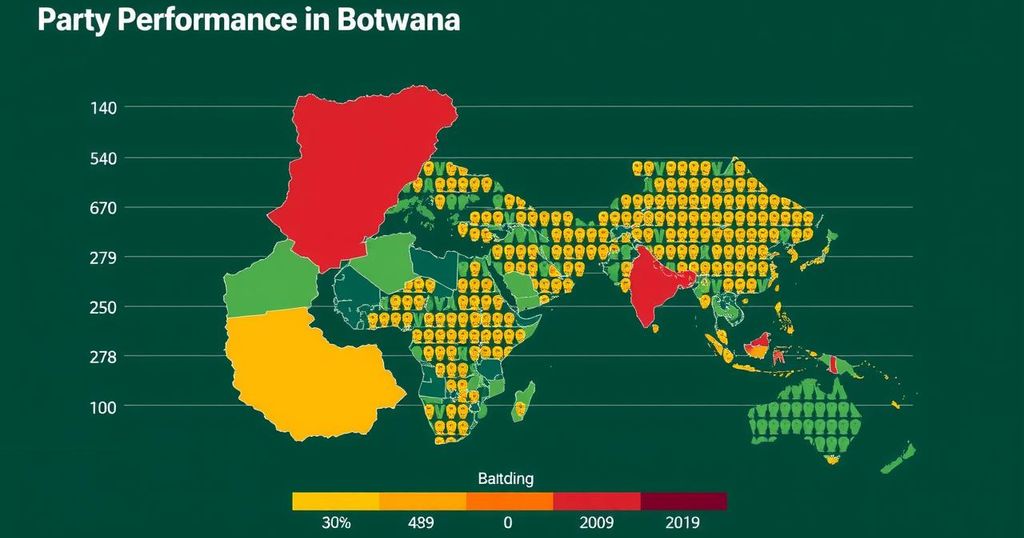Botswana’s Political Shift: The Fall of the BDP and Rise of the UDC

The BDP, ruling Botswana since its independence in 1966, has been ousted by the UDC in a significant election, reflecting a shift in public sentiment against economic mismanagement. The UDC captured 28 Parliamentary seats, attributing the BDP’s defeat to issues like high unemployment and poor public services amid a downturn in the diamond market. President Masisi acknowledged the party’s failures, leading to a call for change in governance focused on economic diversification and job creation.
In a remarkable political transition, the Botswana Democratic Party (BDP), which has held power since the nation’s independence in 1966, has been ousted by the Umbrella for Democratic Change (UDC) and its presidential candidate, Duma Boko. This shift marks a pivotal point in Botswana’s democratic history, raising questions about its future amidst ongoing economic challenges. Despite its long-standing dominance, the BDP’s recent electoral defeats reveal a populace disillusioned with its governance. In the elections, the UDC secured 28 of the available 61 parliamentary seats, indicating a significant shift in public sentiment. Notably, by the conclusion of the counting process, opposition parties had claimed victory in over half of the constituencies. The electoral system in Botswana, similar to that of South Africa, requires a coalition to secure 31 seats in order to form a government. The disappointing performance of the BDP is widely attributed to a downturn in global diamond demand, particularly impacting a nation where diamonds constitute more than 80 percent of exports and account for a quarter of the gross domestic product (GDP). This economic contraction has led to surging unemployment rates, with figures exceeding 27 percent, particularly among the youth, emphasizing the urgent need for diversification—an area the BDP has struggled to adequately address. President Mokgweetsi Masisi, during his campaign, acknowledged the necessity for policy changes to tackle economic issues and aimed to reassure voters of his commitment to lead the nation through its difficulties. However, the message failed to resonate with many citizens, who perceived the government’s response to the economic crisis as inadequate. Political analyst Bongani Malunga attributes the BDP’s defeat to multiple factors, including high unemployment rates and inadequate access to healthcare and affordable essential goods. “BDF lost power due to a few factors. The first one would be unemployment. There is a high unemployment rate in the country. A lot of the youth are frustrated,” he noted. Duma Boko, a prominent figure in the opposition, utilized public dissatisfaction to his advantage, promoting change and economic diversification as central themes of his campaign. Having previously served as the Leader of the Opposition, he is well-versed in the political landscape and leveraged this experience to unify opposition parties under the UDC. Following the announcement of the election results, President Masisi acknowledged the BDP’s failure and expressed his intent to step aside, stating, “We got it wrong big time in the eyes of the people. We were really convinced of our message. But every indication, by any measure, is that there’s no way that I can pretend that we’re going to form a government. I will step aside.” While it may not be entirely equitable to assign all blame to the ruling party, there is a clear expectation that the government is responsible for addressing the welfare of its citizens. The UDC’s success is indicative of a populace seeking more responsive governance and tangible reforms to enhance living conditions. In conclusion, the recent electoral results in Botswana indicate a significant political shift, with the UDC effectively capturing the frustrations of voters who desire economic diversification, job creation, and improved public services. The newly elected government faces the critical challenge of addressing these urgent needs while garnering public trust after decades of BDP leadership.
The Botswana Democratic Party (BDP) has been a dominant force in Botswana’s political landscape since the country gained independence in 1966. Despite its long history of stable governance and economic growth fueled by diamond mining, recent elections signal a drastic shift in the political mood among the electorate. Increasing discontent regarding economic performance, rising unemployment, and inadequate public services has led to an overwhelming desire for change, culminating in the UDC’s electoral victory. This outlines the critical need for political parties to remain attuned to the sentiments and needs of the populace to avoid losing their grasp on power.
The recent electoral upheaval in Botswana, marked by the defeat of the longstanding BDP by the UDC, underscores a critical moment in the nation’s democratic evolution. The electoral results reflect deep-rooted dissatisfaction with economic management and public services, necessitating a keen focus on effective governance by the new administration. The path forward will require addressing the pressing economic challenges and reconnecting with the electorate to build a more inclusive future.
Original Source: www.theeastafrican.co.ke







